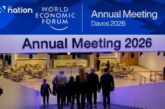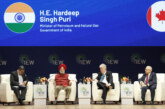
Dr. Arvind Kumar*
The world is at a critical juncture, with global challenges ranging from climate change, health crises, poverty, geopolitical tensions, and growing inequality demanding urgent, coordinated actions. In this context, the Summit of the Future, a key event organized by the United Nations, brought together world leaders, thought leaders, policy experts, and civil society to discuss and design a new global agenda that responds to these challenges. It was seen as a significant platform to reimagine the future of multilateralism, enhance global cooperation, and reaffirm commitments to sustainable development. This is part of Secretary-General António Guterres’ ambitious plan to reform global governance and revitalize multilateralism. With growing concerns about the efficiency and effectiveness of global institutions, the summit was an opportunity for countries to come together and chart a course for the future that transcends individual national interests and embraces collective action. He aptly highlighted that our world badly needs: reform of the Security Council; reform of the international financial system; the meaningful engagement of youth in decision-making; a Global Digital Compact to maximize the benefits of new technologies and minimize the risks; an emergency platform to improve the international response to complex global shocks.
One of the central themes of the summit was the need for multilateralism 2.0, a refreshed approach to global cooperation that reflects the complexities and interdependencies of the 21st century. From technological advancements and the digital divide to climate action, peacebuilding, and global health, the summit focused on ensuring that the international community can address the challenges of the future in a more coordinated and inclusive manner. Several significant outcomes emerged from the summit which will shape the future world. One of the most critical outcomes was the establishment of a roadmap for a Global Digital Compact. Recognizing the importance of digital infrastructure and the internet in driving development, the summit emphasized the need for inclusive and accessible digital technologies.
The compact aims to bridge the digital divide, promote digital rights, and ensure that technological advancements benefit all of humanity, not just a privileged few. The summit re-emphasized the global commitment to the Paris Agreement and the need for urgent climate action. Recognizing that the world is falling behind on critical climate goals, leaders discussed accelerating efforts to reduce emissions, promote renewable energy, and assist developing nations in climate adaptation and mitigation strategies. In an era of growing geopolitical tensions, the summit called for a renewed focus on peace building, conflict prevention, and diplomacy. With conflicts such as the war in Ukraine and tensions in various parts of the world creating instability, the summit stressed the importance of dialogue, multilateral conflict resolution mechanisms, and collective security. The COVID-19 pandemic underscored the importance of robust global health systems. At the Summit of the Future, world leaders committed to strengthening international health frameworks, ensuring equitable access to vaccines, and investing in future pandemic preparedness.
Call for Action
Prime Minister Narendra Modi, representing the world’s most populous democracy and one of its fastest-growing economies, made a significant intervention at the summit. His speech focused on India’s vision for a future shaped by collective responsibility, global peace, and sustainable development. Modi emphasized the concept of “Vasudhaiva Kutumbakam” (the world is one family), which has been a guiding philosophy of his foreign policy. He called for a world where nations, irrespective of their economic power or geopolitical influence, have equal stakes and responsibilities. Global challenges such as climate change, terrorism, and pandemics can only be addressed through a cooperative, multilateral approach. Developed nations have to take greater responsibility for historical emissions and fulfill their commitments to climate finance, technology transfer, and capacity building in developing countries. The onus of climate action should not be disproportionately placed on developing countries, which are often the most affected by climate-related disasters. Recognizing the transformative potential of digital technologies, Global digital framework that ensures inclusivity, transparency, and fairness are to be adopted. India’s achievements in building digital infrastructure that has empowered millions of people, from rural farmers to urban entrepreneurs are to be applauded. Countries should collaborate on a global digital governance model that fosters innovation while protecting citizens’ rights and data privacy because it is the need for developing nations to have greater access to digital tools and infrastructure.
Climate action was at the heart of Modi’s speech, where he spoke about the concept of climate justice the idea that those least responsible for climate change, often the poorest nations, should not bear the brunt of its impacts. India’s ambitious renewable energy targets, particularly in solar energy have showcased the country’s leadership in initiatives like the International Solar Alliance and the Coalition for Disaster Resilient Infrastructure Developed nations should adhere to their climate finance pledges of $100 billion annually to support climate action in developing countries. The importance of technology transfer, particularly in the realm of green technologies, so that developing nations can leapfrog to sustainable development pathways is very important. Another key is the need to reform global institutions to make them more representative, transparent, and effective. Organizations like the United Nations, the World Bank, and the International Monetary Fund (IMF) were established in the mid-20th century and need to be updated to reflect the current global reality, where emerging economies like India, Brazil, and others play a more significant role.
Modi made a strong case for the inclusion of India as a permanent member of the United Nations Security Council, arguing that it is essential for the legitimacy and effectiveness of global governance structures. We have to advocate for greater voice and participation of developing countries in decision-making processes within other multilateral institutions. In an increasingly fragmented world we have to make a renewed commitment to global peace and security, condemn terrorism in all its forms and collectively work to combat extremist ideologies and transnational threats. India has always played a role as a responsible global player, contributing to peacekeeping missions and conflict resolution efforts around the world.
Way Forward
The Summit of the Future has been a pivotal moment for global leaders to come together and address some of the most pressing challenges of our time. India’s vision for a more just, equitable, and peaceful world order by calling for greater global cooperation, digital inclusivity, climate justice, and the reform of multilateral institutions, will shape the future of international relations. As the world moves forward, the principles of solidarity, shared responsibility, and collective action it will be essential in navigating the complex and interconnected challenges of the 21st century. The outcomes of the summit, and the commitments made, will be critical in shaping a future that is sustainable, peaceful, and prosperous for all. One thing is for sure without addressing the blue you cannot become green economy. Water has often been undervalued as a resource, and its contributions to ecosystem services and human development are frequently underestimated. When society fails to recognize water’s true value, understanding the full extent of the problem becomes challenging. However taking the long view is imperative: the summit was never intended to be a one-and-done affair, but rather as the first step in a decades long reform process. Progress is invariably incremental, and a few steps forward is often better than none. What matters is that there’s movement at all.
*Editor, Focus Global Reporter






